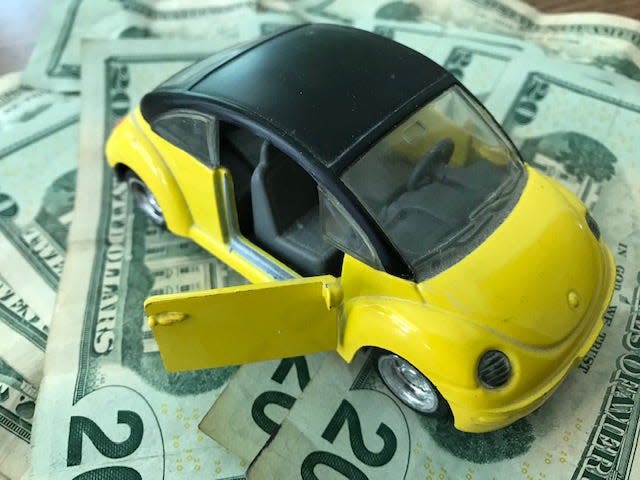When you try to figure out why someone cannot pay their car note, you typically picture a person who saw a pay cut or just lost their job. If you need a car to get to work, after all, the last thing you want to do is get behind on car payments and risk losing that car.
Not much has been typical, though, about the U.S. economy in the past four years since the start of the pandemic.
The jobs picture remains good. The U.S. unemployment rate held steady at 3.7% in January, unchanged from December, according to the U.S. Department of Labor’s report on Feb. 2. We’ve seen a two-year trend where the national jobless rate has remained below 4%, the longest stretch in more than 50 years, according to the Labor Department. February’s jobless numbers will be out March 8.
Yet even though people are working, many are falling behind on their car payments. Younger borrowers and lower-income workers face more difficulties making car payments, indicating increased financial stress, according to the Federal Reserve Bank of New York.
Inflation, not job losses, driving up auto loan delinquencies
Auto loan delinquencies continued to climb higher in the fourth quarter last year, according to data from TransUnion, an information and insights powerhouse that analyzes risk, loan payment patterns, and remains best known for operating one of three nationwide consumer credit reporting agencies.


Some 1.61% of borrowers were delinquent on their auto loan payment — defined as those who are 60 days or more late with a payment — in the fourth quarter, according to TransUnion. That’s up from 1.43% from the same time a year earlier.
Often, consumers aren’t falling behind now because they just lost a job. Instead, their wallets are squeezed as they pay far more than expected for food, housing and other goods.
Some consumers locked into a monthly auto loan payment that they could afford a few years ago but now find themselves struggling to deal with significantly higher costs elsewhere, such as increased premiums for their auto insurance, said Satyan Merchant, senior vice president, automotive and mortgage business leader at TransUnion.
Motor vehicle insurance premiums rose 20.6% in January year over year, according to the consumer price index data for January. That’s the biggest spike on the long list of specific expenses. By contrast, food was up 2.6% year over year and gas prices were down 6.4%. On a 12-month basis, the CPI was up 3.1% in January.
We haven’t seen inflation take off like this in some 40 years and many consumers naturally didn’t build potentially higher prices for everyday goods into their budgets. Maybe it’s higher costs for day care for two-income households with young children. Maybe it’s a spike in rent. Maybe it’s higher prices for food.
On top of that, credit card rates, mortgage rates, car loan rates and other interest rates skyrocketed since 2022, as the Federal Reserve aggressively drove up interest rates to fight inflation.
While the pace of inflation has been coming down more recently, Merchant said, higher prices for many items remain in place.
“These external factors of inflation and other rising expenses are contributing factors to why consumers may be struggling to stay current on their auto loans,” Merchant said.
Some used car buyers facing more stress than others
Another key point: Used car loans in general have performed worse than new auto loans, according to experts, particularly for used auto loans taken out in 2021, 2022 and some in 2023.
Two years ago, Merchant said, a used car buyer figured they could make a $550 monthly payment given their existing budget. They didn’t lose their job, but they did see inflation hit, particularly for insurance.
Merchant notes that auto loan delinquencies now are close to the highest levels seen in the Great Recession, but they aren’t necessarily alarming because delinquency rates are coming off extraordinarily low levels since the pandemic.
The U.S. economy didn’t see high inflation or rapidly rising prices during the Great Recession that started in December 2007 and ended in June 2009. But the job losses were staggering during the longest economic slump since World War II, contributing to an uptick then in auto loan delinquencies.
Some unusual factors influenced the consumer’s ability to pay their car loan in recent years, too. The flush of federal cash through stimulus payments in 2020 and 2021 brightened many financial pictures.
And many people did see breaks or accommodations made, such as allowing borrowers to skip some auto loan payments without damaging their credit scores, during the COVID-19 crisis when they faced some difficulty making car payments.
Borrowers had “exceptionally low default rates throughout the COVID-19 pandemic,” according to an economy blog co-written by an economist and a research associate at the Federal Reserve Bank of St. Louis.
Another pandemic-related pause stretched out for more than three years, enabling consumers with qualifying federal student loans to temporarily stop making those payments. That freed up more cash to cover other bills, such as a car loan payment. But repayments on federal student loan debt resumed for many of these borrowers beginning in October 2023.
The trend for auto loan delinquencies is being carefully watched by lenders and others.
“In the last 20 years, we have not seen more people falling behind on their auto loan payment compared to what we see now,” said Jonathan Smoke, chief economist for Cox Automotive.
He said auto delinquencies using Equifax data, which is what he tracks, set records each month last year and into January based on a data series going back to 2006.
“The silver lining has been that defaults have not risen in lockstep,” Cox said.
The financial distress that some consumers are facing hasn’t been cascading into defaults on the loans and repossessions of cars or trucks. That’s because, he said, the jobs picture is good.
At the end of 2023, repos were up 29% from 2022, according to Cox Automotive. But repossessions were still 5% below 2019 levels.
The most stress is among subprime borrowers, or those with lower credit scores, and among borrowers who took out used car loans a few years ago when used car prices were at their peak, Smoke said.
Consumer Reports’ top 10 car picks: Why plug-in hybrids are this year’s star
High interest rates and higher prices also drove up car payments in recent years.
Credit has tightened substantially since 2021, Smoke said, as lenders navigate the high level of delinquencies and the impact of higher car loan rates.
Right now, he said, the rest of the loan base is healthy by historic standards with fewer subprime car loans being made and higher down payments.
He expects that auto loan delinquencies could fall over the next few months in the short term, as consumers catch up on payments when they receive tax refund cash.
Early tax filers saw average federal income tax refunds of $3,207 based on Internal Revenue Service data through Feb. 16. That’s up 2.1% from the same timeframe a year ago.
“After the spring, I expect delinquency rates to remain down year over year,” Smoke said.
He anticipates that the job market will remain strong and deliver real income gains that will allow consumers more room to navigate financial stress, as inflation continues to cool.
Steps to consider if you can’t make car payments
What should drivers do if they’re having trouble making a car loan payment? Much depends on your own situation. But it’s good to consider the following steps:
No. 1: Find extra cash.
Look where else you might cut back to keep up with your payments. Consider tapping into some emergency savings. If you’re getting a big tax refund, you can set aside a chunk of cash to use toward a car payment.
If you got a raise or, perhaps saw your federal student loan debt forgiven, use that extra cash to address outstanding bills, such as a car payment.
No. 2: Talk to your lender.
Reach out to your lender as soon as possible to explore options, particularly if you’re facing a temporary hardship and know that you’re not going to be able to keep up with the car payment.
“While this can feel like an intimidating phone call to make, the sooner you reach out, the more options you may have available to you,” said Amber Miller, a partner experience manager at Farmington Hills-based GreenPath Financial Wellness.
More options might be available before you actually fall behind, Miller said, but some options are also available if your payment is already past due.


“Lenders don’t really want your car — they want your payments — so they may be able to work with you, especially if you’ve previously kept the loan in good standing and this is perhaps a temporary hardship,” Miller said.
Possible solutions could include deferring your auto loan payments temporarily or working up a new payment plan to temporarily reduce your payments. Or you might change your due date if need more time to come up with a payment.
In some cases, Miller said, a loan modification might work to temporarily reduce payments over a longer period of time.
The Consumer Financial Protection Bureau suggests that you get any agreement with a lender in writing and take time to understand how the move might impact your credit score.
If your credit score is good, you might look at refinancing a loan.
No. 3: If necessary, consider selling a used vehicle.
Smoke noted that spring is a great time to sell used cars, as it is often a time of high demand. It may be possible to buy a lower cost vehicle but review your options.
Find out how much you owe on the car loan first. If you owe more on the loan than what you could get by selling the car or truck, this strategy isn’t ideal.
“If you have built up enough equity to pay off your current loan and put some down on a new vehicle — or potentially even pay cash — this can be a great option to not only resolve the past due payment but also give your budget some breathing room,” Miller said.
Or she suggests that you could ask your lender if they would allow someone else to assume the loan, if you have someone who would be willing. But this is a complex process.
A last resort option is to voluntarily surrender the vehicle to the lender, Miller said.
Such a move shouldn’t be taken lightly because it will hurt your credit score, but it might be a way to avoid a repossession, which would be a worse mark on your credit history.
A repo can be extremely upsetting, as the car is seized without the borrower’s consent. You might walk outside and suddenly not have a car. Miller noted that borrowers also face additional expenses associated with the repossession process.
A repossession could remain on your credit reports for up to seven years, according to the Consumer Financial Protection Bureau’s alert. “Repossession can also mean paying higher insurance rates.”
Borrowers who are facing financial challenges should review their loan agreement to see when they would be at risk of repossession.
Contact personal finance columnist Susan Tompor: stompor@freepress.com. Follow her on X (Twitter) @tompor.
This article originally appeared on Detroit Free Press: Auto delinquencies are up: Steps to take to pay off your loan




